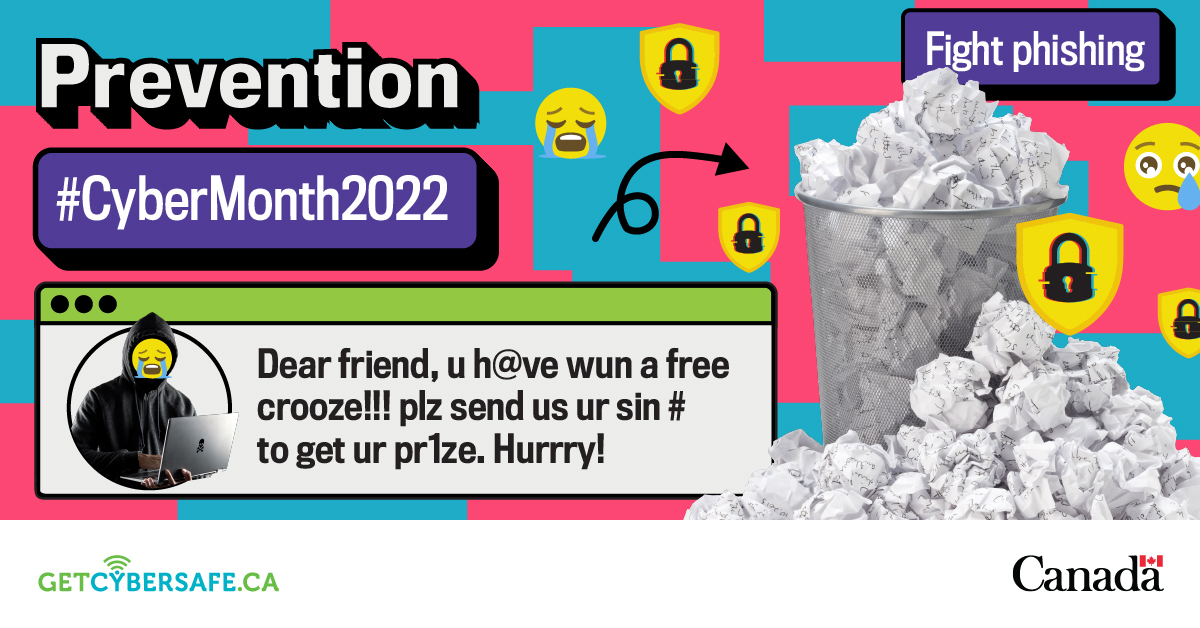October is Cyber Security Awareness Month! Enrol in our Security Awareness Course through Brightspace to learn more about staying safe online, and for a chance to win a pair of Airpods or Ravens merch.
What is Phishing?
Phishing is a cyberattack that uses fraudulent emails, SMS texts, and phone calls to solicit sensitive information from you or to deploy malicious software to your device. You can read our “Where, Why and How Phishing Happens” post to learn more about phishing attacks.
Preventing a phishing scam is easier than dealing with one. Using strong and unique passwords, enabling multi-factor authentication, and regularly backing up your important data are three ways to stay cyber-secure!
Use strong and unique passwords
Passwords are an effective way of protecting your devices and accounts from unauthorized access. Creating strong passwords may seem like a daunting task, but don’t worry — we have some helpful tips and tricks for you below!
Now that you know how to create a strong password, make sure to use unique passwords for each of your accounts. This will protect your other accounts from being compromised with stolen login credentials in the event of a successful phishing attack.
If you feel overwhelmed by the number of passwords you have to keep track of, you can use a password manager. Password managers store all your login credentials for different websites, apps, and devices. They encrypt your password database with a master password — the master password is the only one you have to remember.
If you plan on using a password manager, make sure to follow these guidelines:
- Use a trusted password manager, and ensure that it is updated regularly
- Use a strong master password and multi-factor authentication to secure your password manager
- Don’t use your password manager for sensitive accounts (e.g., email and bank account)
Enable multi-factor authentication
Multi-factor authentication is an extra layer of protection for your devices and accounts. It strengthens your security by requiring at least two items of authentication to log in. Multi-factor authentication relies on any of the following factors:
Who you are
- Fingerprint scanners
- Voice verification
- Facial recognition
What you know
- Security questions
- Passwords and passphrases
- PINs
What you own
- SMS authentication
- Application-based authenticators
- Hardware tokens
Regularly back up your important data
Having a backup of your data can improve your resiliency during a cybersecurity threat. In the event of a phishing attack, backups are critical for two reasons:
Availability: If your system has been compromised, your data might be stolen or deleted. A backup ensures that you can still access the information you need, when you need it.
Recovery: A backup can help you restore your system and data as quickly as possible. This will minimize the amount of information, time, and money that could be lost due to downtime.
Storing your backups
There are three options for storing backups: onsite, offsite, or on the cloud. It is a good practice to have multiple copies of your backups and to store these copies in different locations.
Stay Cyber Secure Year Round
Cyber security doesn’t end after October, so watch the ITS web site and @Carleton_IT on Twitter for information about new campaigns, tips and tricks as they become available.
If you have any questions, please contact ITS Security.
Thank you in advance for your participation!
